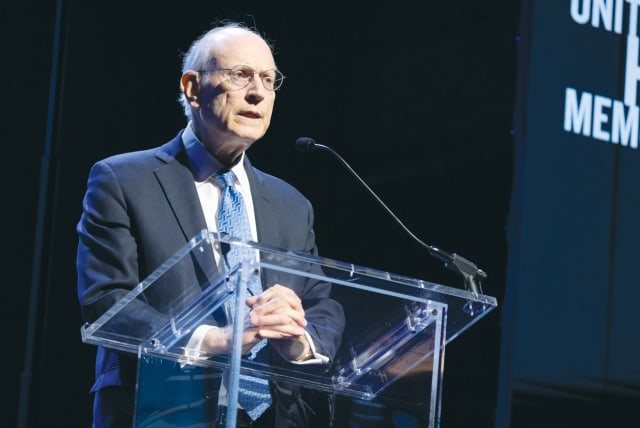Urgent need to combat wide spread of antisemitism in the United States - opinion

As events since October 7 demonstrate, too many people lack historical perspective, digital literacy, and critical thinking skills.
Immediately after Hamas’s October 7 terrorist attack on Israel that left more than 1,200 people killed and some 240 kidnapped, antisemitic activity surged on campuses, in cities worldwide, and unrelentingly on social media.
According to the Institute for Strategic Dialogue (ISD), in the three days after the attack, “antisemitic comments on conflict-related YouTube videos increased by 4,963% when compared with the previous three days.” This online rhetoric is manifesting itself in the real world. According to the ADL, antisemitic incidents in the US have tripled in the three months since the attack.
Hatred of Jews has a long history. Rooted in conspiracy theories that are attractive to individuals and movements with diverse motives, antisemitism has often been a useful tool, and more so at this time when social media and assaults on truth pervade our culture.
Online antisemitism has been animated by the alarmingly resilient conspiratorial thinking that claims Jews control the world , including politics, the media, and financial institutions, and want to destroy Christianity; and orchestrated events such as World War II and the 9/11 attacks.
These lies are attractive to the far Right and the far Left, which is why some white supremacists praised the Hamas attack on Israel. Both extremes claim that Jews seek to engineer the world for their own benefit.
Many of these hateful ideas are drawn from The Protocols of the Elders of Zion, the most widely distributed antisemitic publication in the past 125 years.
The impact of the Protocols
Rarely has a screed so little-known had such impact. Written by the secret police in Czarist Russia, the Protocols is a fraudulent text that claims to be the minutes of a secret meeting of Jewish elders as they plot to dominate the world.
The myths of The Protocols of the Elders of Zion continue to thrive, even though most who amplify the tract’s claims have never heard of the book. Yet they are familiar with its accusations. The durability of these lies is what makes them so dangerous. Conspiracy theories like antisemitism thrive in periods of instability.
The Protocols, long available in multiple languages worldwide, was prevalent in the Middle East well before the State of Israel was founded. It has been a useful tool for Russian leaders from Czarist times to Vladimir Putin today. Iran’s Ayatollah Khamenei, who has called for Israel’s destruction, regularly invokes The Protocols’ accusations in his speeches, and his government news agencies repeatedly reference the Protocols. Xi Jinping’s government allows these dangerous lies to flood Chinese-owned TikTok.
China, Russia, and Iran all benefit from inflaming antisemitism because it creates instability and discord in the West. And The Protocols continues to have strong appeal among neo-Nazis and Hamas, with the latter including a reference to the book in its 1988 charter that calls for genocide of the Jews.
The Protocols has been proven to be a lie many times – by the US Congress, by courts across Europe, and by journalists worldwide. But that doesn’t matter– because those trying to disprove the lie are only seen as proof of the “truth” of Jewish conspiratorial power. This helps explain why Jews – who have often lived as a persecuted minority in other peoples’ nations– have been a convenient scapegoat for centuries.
Nazi leaders understood that The Protocols was a lie, yet they advanced its ideas to demonize Jews. Hitler’s prison autobiography, Mein Kampf, contended that the Protocols revealed the true nature and “ultimate final aims” of the Jewish people, regardless of whether the book was a forgery. But we must never forget that the dangerous ideas of The Protocols were part of the antisemitism that was widespread in Europe well before Hitler wrote his manifesto.
Conspiracy theories appeal because they allow people to explain a complex world in simple terms – in this case by repeatedly blaming the Jews. A guiding principle for conspiratorial thinkers is that we’re never told the real story. Facts don’t matter. Conspiratorial thinkers will not be swayed by proof that The Protocols is fraudulent because they believe in the essence of its ideas. Don’t look for logic in these hateful claims – it doesn’t exist.
The rise in antisemitism coexists with other dangerous trends in the United States. In 2022, the Pew Research Center reported that people under 30 trust information from social media almost as much as they trust traditional news outlets. Truth struggles to assert itself on social media, and all information is treated equally by many.
Countering bad speech with good speech is important, but on its own feels inadequate to the challenges we face. We need a national conversation about free speech, social media, truth, and declining public trust.
The US needs to discuss the power and moderation of social media platforms and how to equip young people for this world of new media and old lies. As events since October 7 demonstrate, too many people lack historical perspective, digital literacy, and critical thinking skills.
The UN chose January 27, the anniversary of the liberation of Auschwitz, as the day on which to remember the Holocaust and reflect on its lessons for our world. Seventy-nine years later, those lessons are more urgent than ever – not just for Jews, but for all of us.
Ambassador (ret.) Stuart E. Eizenstat is chairman of the United States Holocaust Memorial Museum. Sara J. Bloomfield is director of the United States Holocaust Memorial Museum.
Jerusalem Post Store
`; document.getElementById("linkPremium").innerHTML = cont; var divWithLink = document.getElementById("premium-link"); if (divWithLink !== null && divWithLink !== 'undefined') { divWithLink.style.border = "solid 1px #cb0f3e"; divWithLink.style.textAlign = "center"; divWithLink.style.marginBottom = "15px"; divWithLink.style.marginTop = "15px"; divWithLink.style.width = "100%"; divWithLink.style.backgroundColor = "#122952"; divWithLink.style.color = "#ffffff"; divWithLink.style.lineHeight = "1.5"; } } (function (v, i) { });

